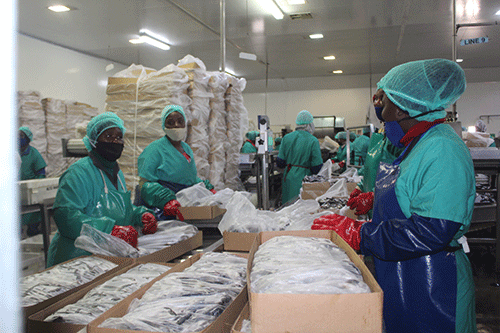WALVIS BAY – Requests to fish in the 200-metre isobar should not be entertained or allowed, nor should Namibian operations be compared with other countries that allow fishing in their spawning areas.
This is according to chairman of the Confederation of Namibian Fishing Association Matti Amukwa, who, backed by the fishing industry, opposes the request of the Wet Landed Horse Mackerel Association (WLHMA) sector to be allowed to catch within the 200m restricted zone.
The industry’s objection comes after the WLHMA last month sought Cabinet intervention to be allowed to fish in the restricted area, as the sector’s 1 300 jobs are at risk.
Chairperson of the sector Jason Angala, in a letter sent to Cabinet last month, indicated they directly sought immediate relief to rescue the sector, which mainly employs women.
“There had been no constructive response from the ministry, apart from 7 September when the minister advised in a phone call that the Cabinet submission process is taking longer than anticipated, as the ministry’s committee was not in support of allowing exclusive zones for smaller, wet horse mackerel vessels to catch on an interim experimental basis, based on an inside 200m depth while a long-term solution is being sought,” Angala said in his letter seen by New Era.
He added the majority of horse mackerel is being caught by large freezer trawlers, who can trawl 24 hours a day with large nets on scattered fish, while smaller wet HM vessels, in particular RSW trawlers, can only target shoals that are not available during winter periods as shoals migrate closer to shore due to water temperatures.
The freezer industry employs a mere 400 fishermen on vessels, despite having the biggest chunk of the 330 000 metric ton quota.
According to him, the decision to introduce a restriction at the 200m-depth level was done arbitrarily, and it was not based on any scientific research or recommendation to protect marine resources, but rather to protect the purse seine industry from interference in the 90s and early 2000s.
“The 200m restricted zone is not a gazetted legislation, and it is only contained in the horse mackerel rights conditions document, issued 11 December 1997. That may be changed at the discretion of the minister from time to time. The said conditions vaguely describe the depth restriction for horse mackerel as ‘about 200 metres’ – unlike hake, where Regulation 63 of 10 April 2015 is very precise in its description and provides the required clarity. Therefore, we humbly request interim exclusive catching zones as a relief, as jobs are at stake.”
Industry says no
Amukwa said they do not support fishing in the restricted zone, as the industry plays a huge role in food security – not only in Namibia but in other countries.
“Therefore, I would like to reiterate once again the strongest opposition in support of the minister against the permission for anyone to be allowed to fish in the 200m isobar. The 200m isobar restrictions were introduced for scientific reasons. The shallow waters are the spawning grounds for most of the commercial species in Namibia as well as the cob,” he said.
He further indicated the isobar, apart from being the spawning grounds, is also the nursery grounds for many of the species before they grow to a size where they will migrate into deeper waters.
“Fishing cannot be allowed in these waters, as the disturbance of the young fish, caused by fishing, will impact the biomass of all the species that are important to the Namibian fishing industry, including the horse mackerel. Opening the grounds, even for a short period, will set a precedent, and sectors of the industry, including mining, might be enticed to also request access to these waters – and it will be difficult to deny them access once the ‘no fishing’ rule has been broken. It will also jeopardise the Hake Marine Steward Council (MSC) certification, which was awarded considering the prudent way we manage our fisheries – and the closure of that area was one of the most positive points taken into the assessment.” – edeklerk@nepc.com.na


